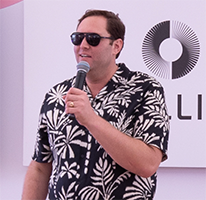DIRECT Newsline spoke with Barbara Hoffman, an employee at Empire Blue Cross, one year ago. She was at work on the morning of Sept. 11 in the North Tower when the terrorists struck. Here is her story one year later.
With the smell of acrid smoke still lingering in her hair, Barbara Hoffman picked over grapes and fresh vegetables at the supermarket near her home on the East Side.
It was Sept. 11, 2001 and Hoffman had that morning narrowly escaped the horrors of the North Tower, the first tower struck that warm, sunny Tuesday, where she worked for Empire Blue Cross.
She bought her food and returned home to cook a meal. She noticed that life appeared ordinary. People were out in the streets, shopping, walking. An odd scene when juxtaposed against the scenes of horror she had witnessed earlier as pure evil made its way to downtown Manhattan. But it was a scene nonetheless that Hoffman was determined to return to. “Things looked so normal,” she said. “That was the pattern I wanted to get into and to just stay very, very strong.”
She had turned her back that terrible day as colleagues shouted that people were jumping from the buildings. And, despite the onslaught of media coverage over the last year, Hoffman has not watched any televised coverage of the event. She has seen only a few images on the Internet where she reads the news. She has not visited Ground Zero and has no plans to. “I don’t want those pictures burned into my brain,” she said. “I think that’s why I’m doing alright.”
In some ways her life hasn’t changed much.
She works in the same job she had that Tuesday when she arrived at 8:15 a.m. at her offices on the 29th floor of 1 World Trade Center, as an administrative assistant to the president and COO, David Snow. She was back at work in a temporary location in Melville, NY, on Sept. 13. And after nine weeks of commuting two to four hours a day in a car pool, she now travels 20 minutes to the firm’s new headquarters on 42nd St.
She still does some community service work. She talks to her sister in California on the phone, the first person she called on 9/11 who at the sound of Hoffman’s voice erupted in hysterics from the worry. She shops for fruit and fish and vegetables in her neighborhood.
But, on occasion, she “loses it.” She lost 11 colleagues that day and three others were so badly burned they remained in burn units for months. All of the personal effects she kept at the office are gone; pictures, shoes, gifts, mementos. She remembers moments in time, like seeing Ed Beyea, a co-worker, paralyzed from the neck down in a freak diving accident at age 22, trying to escape down the staircase and saying to herself, “He’s never going to make it down.”
He didn’t, dying with his friend Abe Zelmanowitz who refused to leave his side. Months after the attack, pictures taken by an Irish intern at her offices came back to haunt her. The images of every day office work, the view out to the Hudson River and the traffic moving by on the street below. And she remembers the people, the thousands of lives, all lost that day.
“It’s very important for me not to forget but to move on,” she said. “I can’t change what happened but I can change how I feel about it.”
 Network
Network

